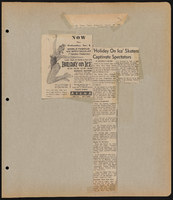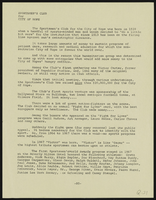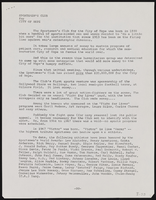Search the Special Collections and Archives Portal
Search Results
Horse Racing Collection
Identifier
Abstract
The Horse Racing Collection (1927-1979) contains brochures, handicapping information, programs, and articles written by Harry McCalla related to horse racing. There are also advertisements and clippings from racing forms. This material covers various venues in the United States.
Archival Collection
Greg Cava Photograph Collection
Identifier
Abstract
The Greg Cava Photograph Collection (approximately 1980 to 2003) is comprised of work created by Las Vegas, Nevada photographer Greg Cava. It includes photographs, negatives, and slides that document Las Vegas entertainment, sporting events, and hotel-casino development. The collection also includes material from Cava's time as photographer for the University of Nevada, Las Vegas (UNLV) athletic events, including photographs, programs, and media guides from the UNLV basketball and football teams.
Archival Collection

Joe Cortez interview, November 29, 2018: transcript
Date
Archival Collection
Description
It is February 20th, 1995, the world’s eyes are set on El Estadio Azteca, Mexico’s largest sports stadium. Inside the facility, in front of an estimated 130,000 people, Mexican legend, Julio César Chávez, is defending his WBC super-light weight title against the American, Greg Haugen. In front of his countrymen, Chávez is punishing Haugen, who disrespected him years earlier in Las Vegas. During the 5th round, Haugen is barely able to stand on his feet, as the record breaking crowd calls for him to be knocked out. Chávez continues to land a barrage of punches, until finally the third man in the ring that night decides to step in to put an end to it. The stadium erupts with cheers for El León de Culiacán. The history books remembers this fight as the largest outdoor fight in the history of the sport. Casual boxing fans will always remember Chávez and Haugen battling it out in the heart of Mexico, but a third man stood in the ring that night: Joe Cortez. Cortez was born to Puerto Rican parents in Spanish Harlem, New York City. Boxing was always a part of this Hall of Fame referee’s life. Cortez won multiple Golden Glove tournaments as an amateur boxer and had a successful, but short career as a professional boxer. Outside of boxing, Cortez also found success as military man, deli owner, hotel manager, and director of an ophthalmologist outreach program. Eventually, he would find himself back in the boxing ring, this time as a referee. His career as a referee took Cortez to the top of the boxing world. When he retired in 2012, Cortez officiated 176 World Championship Fights. In 2011, Cortez was inducted in the International Boxing Hall of Fame alongside, Mike Tyson, Julio César Chávez, Kostya Tszyu, Ignacio Beristain, and Sylvester Stallone.
Text
Yves Auriol oral history interview, 2024 June 21
Level of Description
Scope and Contents
Oral history interview with Yves Auriol conducted by Stefani Evans and Claytee D. White on June 21, 2024 for Game On! The Oral History of Las Vegas Sports project. In this interview, Auriol describes his childhood in Toulouse, France during World War II. The third oldest of seven children, Auriol learned the art of fencing from his brother. He graduated in 1955 from Lycee de Toulouse where he earned a master's degree as a fencing master from the Institute National du Sport in Paris. Eventually, he became a top fencing teacher in the sport, and in 1971 he followed his brother to the United States. Auriol served as head women's fencing coach at Notre Dame from 1985-95 and assumed head coaching responsibilities for the men's and women's programs in 1996. He developed into one of the most successful and respected coaches in the nation, and is a three-time Olympic coach. Digital audio and photographs available.
Archival Collection
Collection Name: Game On! The Oral History of Las Vegas Sports Interviews
Box/Folder: Digital File 00
Archival Component




